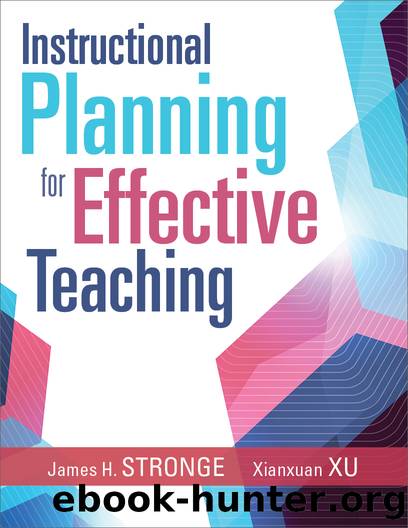Instructional Planning for Effective Teaching by Stronge James H.;Xu Xianxuan;

Author:Stronge, James H.;Xu, Xianxuan;
Language: eng
Format: epub
Publisher: Solution Tree
Published: 2016-08-15T00:00:00+00:00
What Research Says About Differentiated Instruction for Gifted and High-Ability Learners
Placing value on appropriately challenging schooling reflects learning theory and research in general, and not just for gifted and high-ability learners. Nevertheless, students, parents, teachers, and various research report that school experiences for gifted learners frequently do not provide sufficient challenges to promote learning (Little, 2012). Research also highlights the curvilinear relationship between boredom and ability, with students at the highest and lowest level of ability most at risk for experiencing boredom (Little, 2012).
In multiple studies, effective teachers of gifted and high-ability learners are found to be highly competent in selecting appropriate high-level materials that could match task complexities and individual skills (Csikszentmihalyi, Rathunde, & Whalen, 1993; Nelson & Prindle, 1992; Shore & Delcourt, 1996). Planning a range of instructional strategies focusing on in-depth learning is a key to properly matching instructional plans with the needs of gifted and highly-ability students (Hansen & Feldhusen, 1994; VanTassel-Baska & Little, 2003).
Effective teachers in general education classrooms facilitate their gifted studentsâ ability to gain access to various resources, such as content-area experts and mentors, pulled-out advanced classes, and counseling (Shore & Delcourt, 1996; Westberg & Archambault, 1997). An international cross-case study indicates that effective teachers of gifted learners place a strong emphasis on planning, with clear connections to assessment. Formal and informal assessment results of student learning influence their planning. These teachers are purposeful in their planning and link objectives and assessment. Additionally, they pay particular attention to variation and flexibility in designing and organizing instructional activities (Stronge, Little, & Grant, 2009).
Another case study finds that exemplary teachers of gifted learners place instructional planning very high on their list of practices for success. They focus on the design phase of teaching, knowing that no single plan or process works for every student. Additionally, they continuously change their actual practices in the classroomâunits, lessons, and basic daily workâto reinvent their instruction and maximize learning opportunities (Graffam, 2006).
For nearly fifty years, the field of gifted education has sought to distinguish how effective instruction for high-ability learners is different from effective instruction for general learners. Synthesizing extant research, Jessica Hockett (2009) summarizes five principles that can depict what advanced and challenging learning looks likeâtwo generic terms often used in describing differentiation for high-ability learners.
â¢Principle 1: Use a conceptual approach to organize or explore content that is discipline-based and integrative.
â¢Use the principles, skills, theories, ideas, and values most essential to a field of study to illuminate the nature of the discipline itself.
â¢Use the structure of the discipline itself to inform how to arrange learning experiences.
â¢Ensure students see where the new learning fits into the larger body of knowledge and from where it originates.
â¢Expose students to multiple perspectives, and apply knowledge at multiple levels.
â¢Principle 2: Pursue advanced levels of understanding through abstraction, depth, breadth, and complexity.
â¢Abstraction involves the ability to work with the implications and extensions of ideas rather than concrete examples and illustrations.
â¢Depth is defined as intensifying learning, which includes a range of practices, such as using
Download
This site does not store any files on its server. We only index and link to content provided by other sites. Please contact the content providers to delete copyright contents if any and email us, we'll remove relevant links or contents immediately.
Chicken Soup for the Soul Presents Teens Talkin' Faith by Jack Canfield(647)
Understanding PDA Autism in Kids: A Guide for Parents and Teachers to Support Neurodiverse Learners by Jehu Len(554)
The Victorian Era: A Captivating Guide to the Life of Queen Victoria and an Era in the History of the United Kingdom Known for Its Hierarchy-Based Social Order by Captivating History(423)
Brain Teasers to Build Critical Thinking Skills by Safarova Kris(411)
Brain Teasers to Build Critical Thinking Skills: Brain Exercises for Tech, Banking, Case Interview Prep, and to Keep Your Mind Sharp by Kris Safarova(411)
100 Ideas for Secondary Teachers: Engaging Parents by Janet Goodall & Kathryn Weston(386)
Python 101 - Fundamentals by Sam(373)
Critical Curriculum Leadership : A Framework for Progressive Education by Rose M. Ylimaki(363)
Writing Solid Code: Development Philosophies for Writing Bug-Free Programs by Steve Maguire(356)
The Art of Emotional Validation: Improve Your Communication Skills and Transform Your Relationships by Validating Emotions and Feelings by Emily Wright(339)
Intersectionality in Educational Research by Dannielle Joy Davis; James L. Olive; Rachelle J. Brunn-Bevel; Susan R. Jones(331)
The Knights Templar: An Enthralling History of the Rise and Fall of the Most Influential Catholic Military Order by Wellman Billy(329)
A Beginner's Guide to SSD Firmware by Unknown(327)
The Future Knowledge Compendium by Ellyard Peter;(319)
How to be assertive in any situation by Hadfield Sue & Hasson Gill(310)
Making Connections in and Through Arts-Based Educational Research by Hala Mreiwed Mindy R. Carter Sara Hashem Candace H. Blake-Amarante(305)
Foundations of Educational Research by Victoria Elliott(305)
What Every Teacher Should Know about Learning, Memory, and the Brain by Tileston Donna E. Walker;(305)
Message from the Pleiades; The Contact Notes of Eduard Billy Meier v1 only by unknow(301)
